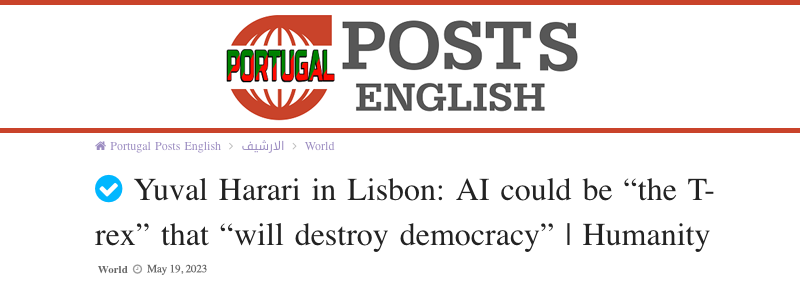

No, artificial intelligence (AI) is not a technology like others that have emerged throughout history and which have also been met with misgivings. Newspapers, radio and television cannot generate false news without a human being writing it and “the atomic bomb cannot decide which city to destroy”, but AI “is the first technology that can make decisions for itself”. Therefore, it is urgent for governments to regulate it, warned the Israeli historian Yuval Noah Harari this Friday, at Estufa Fria, in Lisbon.
At the conference he gave, Humanity, it’s not that simple, organized by the Francisco Manuel dos Santos Foundation, the professor of World History at the Hebrew University of Jerusalem began by recalling one of his recurring ideas. “Now, we are almost like God, in terms of the powers of creation and destruction. We have the power to create new life, but also to destroy it”, he defended. The human being faces two potential collapses: the climatic and the technological.
It was in this second that the thinker focused, who has criticized the accelerated development of AI. With a dash of hope: “If we cooperate, we can deal with climate change and AI.”
The challenge is huge not least because “we haven’t seen anything yet” in terms of the true capabilities of AI. He resorted to an image: if the “evolution of life on Earth took 4000 million years”, AI will take “a few decades or years”, much less time than many, including him, predicted. If ChatGPT equals the “amoebas of the AI world, what will T-rex look like?” he asked.
“AI is developing too quickly. It is the obligation of governments to slow it down”, he asked. Stopping or regulating the development of this technology “is not going to happen”, but he sees a way forward. “What I expect from governments is to regulate the implementation of AI in societies”, imposing safety rules similar to what happens, for example, in the automotive industry.
Yuval Harari even advanced with a proposal: “Illegalize the counterfeiting of humans”, as with money. If a law like this were passed, artificial intelligence could not impersonate a human, it would have to warn the user that he was “talking” to a machine. In this way, the risks of mass manipulation would be reduced. Laws like this one are needed because “technology is not going to regulate itself”. However, “instead of being united” in the face of these threats “we are increasingly divided”.
The matter is very serious, he insisted. Artificial intelligence can “destroy the common conversation” between humans, which is essential for democracy. “The conversation is made with language” and is based on “trust”. Without regulation, AI will undermine this trust: how can we know whether we are having a discussion – about the politician we want to elect, for example – with a machine or a human? “Democracy is a conversation between people”, not between bots and people, he summed up.
We already have a sample of this democratic corrosion in the “polarization” promoted by social media algorithms, which spread false news. Now this is “very primitive artificial intelligence”. It is already much more sophisticated: it can “create the fake story or the fake video by itself”. He concludes: “If we don’t regulate this, the chances of democracies surviving are very low.”
Sapiens in stress
The author of Sapiens: A Brief History of Humankind (2013) fears the effects of AI and an increasingly digital world on new generations. “We have no idea what the result of this will be in terms of education in ten or 20 years.”
Not against technology – he met his husband online and thanks the Internet for making life easier for a homosexual in a conservative society like the one he grew up in. But the Internet has allowed you to meet someone in flesh and blood, not an avatar, not mere pixels on a screen. “We are beings in bodies”, but the new generations will be able to experience a dematerialized society, in which we may be tempted to live outside the body, almost 100% online in the “metaverse”.
He believes that this permanent technological revolution generates stress and that “we are close to the moment when we cannot take it anymore”. It is necessary to “slow down”, under penalty of “breaking down psychologically”.
What makes Yuval Noah Harari optimistic? “Humans still have an enormous capacity for change. We have immense potential that we don’t even know about. The evolution of AI can cause us to lose much of our potential without even knowing that we have lost it. We are nowhere near our full potential. If we invested every euro and minute that we invest in AI in our minds and consciences, we would be fine. But the structure of incentives in our society and economy takes us in the wrong direction.”
A few weeks before his talk in Lisbon, Yuval Noah Harari presented “AI and the future of humanity” in the keynote presentation at the Frontiers Forum in Montreux, Switzerland on April 29, 2023. You can watch the video from his keynote below: